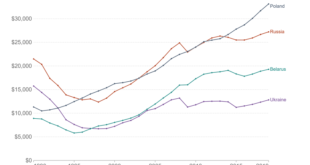For a Russian opposed to the war, and helpless to do anything about it, the horror is not that incomes will fall 10% this year, nor that unemployment will double, or that inflation will be 30%. Rather: in order to get out of this fall – not just to go to growth, but at least to restore it, you need not just make the decision “the war is over” and start negotiations on the gradual lifting of sanctions. We need to repeal dozens if not hundreds of laws passed in the last ten years. I would say...
Read More »The dismal future of the Russian economy (and Ukraine’s?)
For a Russian opposed to the war, and helpless to do anything about it, the horror is not that incomes will fall 10% this year, nor that unemployment will double, or that inflation will be 30%. Rather: in order to get out of this fall – not just to go to growth, but at least to restore it, you need not just make the decision “the war is over” and start negotiations on the gradual lifting of sanctions. We need to repeal dozens if not hundreds of laws passed in the last ten years. I would...
Read More »IPA’s weekly links
Photo: Larry George II on UnsplashGuest post by Jeff Mosenkis of Innovations for Poverty Action For your travels this weekend I’ve put up some favorite podcast recommendations, plus some bonus reading, and kids’ podcasts. (Though they’re all potentially kids’ podcasts, in that when my kids misbehave in the back seat I threaten to put on an econ podcast and they shape up pretty quick.)The Nathan Nunn article on rethinking economic development was very readable. He argues that instead of...
Read More »Ten things to know about this year’s Alberta Alternative Budget
The Alberta Alternative Budget (AAB) is an annual exercise whose working group consists of researchers, economists, and members of civil society (full disclosure: I’m the Editor). Our general mandate is to create a progressive vision for Alberta to boost economic growth and reduce income inequality. This year’s document was released today, and here are 10 things to know: The NDP government of Rachel Notley government made important advances with respect to childcare,...
Read More »Ten things to know about this year’s Alberta Alternative Budget
Posted by Nick Falvo under aboriginal peoples, Alberta, budgets, Child Care, demographics, early learning, economic growth, education, employment, employment standards, fiscal policy, health care, homeless, housing, HST, income distribution, income support, Indigenous people, inequality, labour market, macroeconomics, minimum wage, NDP, population aging, post-secondary education, poverty, privatization, progressive economic strategies, public infrastructure, public services,...
Read More »MEDIA RELEASE: Alberta should increase social spending; cuts are not the way to go
(June 24, 2019-Calgary) With Alberta’s economy still facing challenges and vulnerabilities, the Alberta government should not be doling out tax cuts or cutting social spending, according to the Alberta Alternative Budget (AAB) released today. “Alberta still has, by far, the lowest debt-to-GDP ratio of any province,” says Nick Falvo, editor of the report. “We are in a good position to increase spending on education, invest in affordable child care, offer free dental care to Albertans...
Read More »MEDIA RELEASE: Alberta should increase social spending; cuts are not the way to go
(June 24, 2019-Calgary) With Alberta’s economy still facing challenges and vulnerabilities, the Alberta government should not be doling out tax cuts or cutting social spending, according to the Alberta Alternative Budget (AAB) released today. “Alberta still has, by far, the lowest debt-to-GDP ratio of any province,” says Nick Falvo, editor of the report. “We are in a good position to increase spending on education, invest in affordable child care, offer free dental care to Albertans...
Read More »Timothy Taylor — Macaulay on Economic Progress, 100 Years Before Keynes
Economists have long been fascinated by a 1930 essay written by John Maynard Keynes called "Economic Possibilities for Our Grandchildren" (available various places like here and here). Writing in the opening storms of what would become the Great Depression, Keynes maintained that the main issues facing the economy in the long run was an adjustment to ongoing technological progress. He wrote: "We are suffering, not from the rheumatics of old age, but from the growing-pains of over-rapid...
Read More »Chris Hamilton — The End Of Growth Among “Haves” Dooms Growth Among “Haves” & “Have Nots” Alike
The global economic system is premised on growth, not just any growth, but growth where it matters (economically). However, population growth (the foundation of economic growth) among the high and upper middle income nations of the world is rapidly winding down. As I have outlined previously, total births have been declining among the combined high/upper middle income nations since 1988 and now births are declining everywhere but among the low income nations of the world (HERE). Without...
Read More »Smooth Sailing Ahead For the Global and Canadian Economy?
The consensus forecast of just about everybody – the IMF, the OECD, the Bank of Canada, the Canadian banks – is that Canada will share in a global recovery from the stagnation which followed the financial crisis of a decade ago. All of the major economies – the US, the EU, China, Japan – are growing; business investment is finally on the upswing from depressed levels; world trade is on the rise again; and fiscal austerity has more or less run its course. Central bankers, we are told, can be...
Read More » Heterodox
Heterodox




